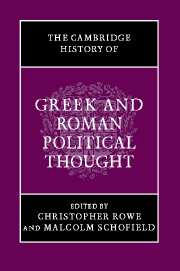Book contents
- Frontmatter
- Introduction
- PART I ARCHAIC AND CLASSICAL GREECE
- 1 Greek political thought: the historical context
- THE BEGINNINGS
- 2 Poets, lawgivers, and the beginnings of political reflection in archaic Greece
- 3 Greek drama and political theory
- 4 Herodotus, Thucydides and the sophists
- 5 Democritus
- 6 The Orators
- 7 Xenophon and Isocrates
- 8 Socrates and Plato: an introduction
- 9 Socrates
- 10 Approaching the Republic
- 11 The Politicus and other dialogues
- 12 The Laws
- 13 Plato and practical politics
- 14 Cleitophon and Minos
- ARISTOTLE
- PART II THE HELLENISTIC AND ROMAN WORLDS
- Epilogue
- Bibliographies
- Index
- Map 1. Greece in the fifth century bc"
- References
13 - Plato and practical politics
from THE BEGINNINGS
Published online by Cambridge University Press: 28 March 2008
- Frontmatter
- Introduction
- PART I ARCHAIC AND CLASSICAL GREECE
- 1 Greek political thought: the historical context
- THE BEGINNINGS
- 2 Poets, lawgivers, and the beginnings of political reflection in archaic Greece
- 3 Greek drama and political theory
- 4 Herodotus, Thucydides and the sophists
- 5 Democritus
- 6 The Orators
- 7 Xenophon and Isocrates
- 8 Socrates and Plato: an introduction
- 9 Socrates
- 10 Approaching the Republic
- 11 The Politicus and other dialogues
- 12 The Laws
- 13 Plato and practical politics
- 14 Cleitophon and Minos
- ARISTOTLE
- PART II THE HELLENISTIC AND ROMAN WORLDS
- Epilogue
- Bibliographies
- Index
- Map 1. Greece in the fifth century bc"
- References
Summary
According to W.K.C.Guthrie in his A History of Greek Philosophy ‘the primary aim of education for statesmanship never left [Plato’s] thoughts. It was certainly his intention that many of his pupils should leave the Academy for politics, not as power-seekers themselves but to legislate or advise those in power, and we have the names of a number who did so.’ The distinguished historian P. A. Brunt takes a different view:
The evidence on the political activities of Plato’s pupils is too weak to sustain in itself the thesis that it was one of his chief aims to prepare them for statecraft. Some were falsely labelled his pupils, but there is no proof that the rest were impelled by his teaching to take part in public affairs, still less that they tried to implement his ideas, or succeeded. The testimony of Isocrates suggests that his disciples were primarily devoted to unworldly studies, and this is supported by Plato’s own skit in the Theaetetus on philosophers of his own kind.
As these contradictory assessments suggest, the sources on Plato and practical politics are not easy to handle, and interpretation tends to reflect the more or less self-conscious preconceptions of the interpreters about for example the Academy (how far was it yet an institution?), or the general credibility of ancient biography and epistolography, or the still more general issue of the impact on public life made by philosophy now or then. The present writer inclines to scepticism or minimalism in all these areas.
- Type
- Chapter
- Information
- The Cambridge History of Greek and Roman Political Thought , pp. 293 - 302Publisher: Cambridge University PressPrint publication year: 2000
References
- 7
- Cited by

